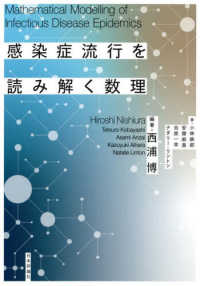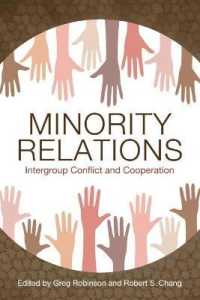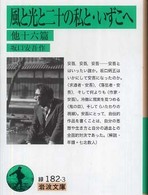- ホーム
- > 洋書
- > 英文書
- > Performing Arts
Full Description
Analyzes audio recordings of interwar Hebrew plays, providing a new model for the use of sound in theater studies.
Finalist for the 2020 Jordan Schnitzer Book Award in the category of Jews and the Arts: Music, Performance, and Visual presented by the Association for Jewish Studies
Possessed Voices tells the intriguing story of a largely unknown collection of audio recordings, which preserve performances of modernist interwar Hebrew plays. Ruthie Abeliovich focuses on four recordings: a 1931 recording of The Eternal Jew (1919/1923), a 1965 recording of The Dybbuk (1922), a 1961 radio play of The Golem (1925), and a 1952 radio play of Yaakov and Rachel (1928). Abeliovich traces the spoken language of modernist Hebrew theater as grounded in multiple modalities of expressive practices, including spoken Hebrew, Jewish liturgical sensibilities supplemented by Yiddish intonation and other vernacular accents, and in relation to prevalent theatrical forms. The book shows how these recorded performances provided Jewish immigrants from Europe with a venue for lamenting the decline of their home communities and for connecting their memories to the present. Analyzing sonic material against the backdrop of its artistic, cultural, and ideological contexts, Abeliovich develops a critical framework for the study of sound as a discipline in its own right in theater scholarship.
Contents
List of Illustrations
Acknowledgments
Preface: In the Synagogue
Introduction
1. The Messiah's Mother Lamentation: The Sonic Imagination of The Eternal Jew
2. The Rise and Fall: The Return of The Dybbuk and the Making of the Acoustic Community
3. "Who Will Save Us?" Hebrew Specters and the Performativity of Cultural Rupture in The Golem
4. Yaakov and Rachel: The Experience of Source
Epilogue: Against Ephemerality
Notes
Bibliography
Index








